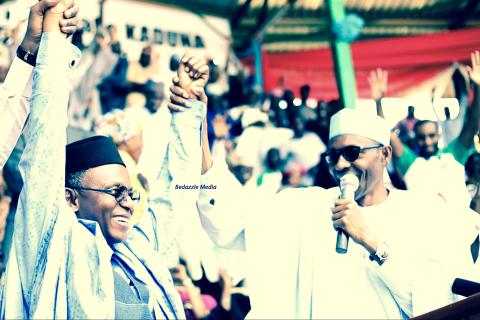
As one of the key actors in the All Progressives Congress (APC) quest to wrestle control of the Nigerian government from the People’s Democratic Party (PDP), in his first major interview since the Saturday, April 11th, gubernatorial elections, El-Rufai sat down with SaharaReporters to discuss APC’s plans for Nigeria, his plans for his home-state, and the role that social media had to play in the 2015 General Elections.

“The polls were clear,” El Rufai says, nodding convincingly in his Kaduna home on the day after his gubernatorial election, “Since December 2014, we knew we would win the presidential elections. All the numbers that we crunched pointed to it.”
As one of the key actors and strategists behind APC’s resounding victories in the March 28th, 2015 presidential elections – which saw the emergence of General Muhammadu Buhari, as Nigeria’s President-elect, Mallam Nasir El Rufai, a one-time Minister of the Federal Capital Territory (FCT), and the incoming Governor of Kaduna State, believes that a numbers-focused campaign led to the APC’s resounding victory at the national and statewide polls.
“We crunched the numbers once a month - sometimes a few times a month,” El Rufai said, referring to how the APC employed political polling to determine its campaign strategies, “From our numbers we saw that any of the APC presidential aspirants would have beaten President Jonathan.”
Of course, to the Governor-elect, who carved out his significant political following from his days as a tireless reformer for a Abuja that followed the city’s original master plan, numbers were important, but it took a concerted effort and streamlined message to get the APC’s vision for a new Nigeria across to Nigerians from all walks of life.
Speaking on some of the expected changes that he strongly believes that Nigerians will be able to hold the APC government responsible for, El Rufai notes that the underlying characteristics of the incoming APC administration will be to entrench integrity, restore value for money, ensure government accountability, and to “terminate ‘badness’ in the shortest possible time.”
“Of course the ‘goodness’ might take some time – maybe a few months or years,” he says, “But when you look at the damage done to the country over the last 16 years, it will take some time to undo that damage.”
That is where El Rufai believes that the young people of Nigeria have a dual role to play. In the first instance, concerning uneducated and under-educated youth, the Governor-elect mentions that in his state in particular, he will be working to ensure that literacy rates improve – by working to achieve universal free public education across the board – a situation he says will lead to development.
In the second instance, the Governor-elect notes the role of the young people in the electoral process – especially those on social media that exposed wrongdoings, undermined the flawed or failed policies of the outgoing administration, and brought the world’s attention to Nigeria. This role El-Rufai says, must now be translated into electoral value to ensure that young activists, both on and off social media, who have contributed to the growth of Nigeria, can get more involved in the decision-making processes.
Over the past few years, El Rufai has worked on an initiative called “Young Voices” aimed at promoting the ideas of Nigeria’s teeming youthful population, working to ensure that many up and coming Nigerian leaders in the social and political space have a launching pad. With the new APC government in power, he suggests that these sorts of individuals should have more of a say in the affairs of the country.
“If you look at the activists on social media, many of them need to translate their online following to electoral value,” he says, convinced of the impact of the Facebook and Twitter generation, “We have to find a way to get our young people more involved.”
As of the time of this interview, with announcements gradually pouring in from the various polling units in his Kaduna State, with 80% of polling stations reporting, Governor-elect El-Rufai maintained a convincing lead. In this regard, when asked for what he would want his and the APC administration in Nigeria to be remembered for, he smiles and says unflinchingly: “Make Kaduna what it used to be. Make Nigeria what it used to be. For everyone.”